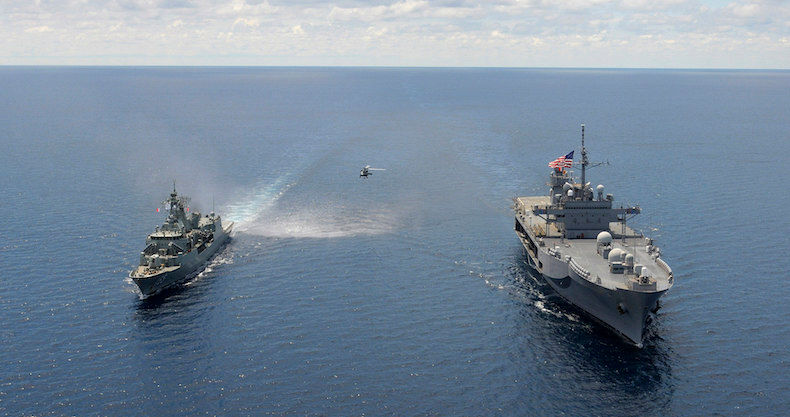Australia’s South China Sea conundrum
- Feb 19, 2017
- 4 min read
Before Trump was inaugurated, there was speculation that his administration would ask Australia to participate in joint naval patrols or ‘freedom of navigation operations’ (FONOPs) in the hotly disputed South China Sea. The new Secretary of State Rex Tillerson’s comments that China would ‘not… be allowed’ to access its artificially created islands portends an increased US involvement in the region. Clearly, due to Australia’s treaty commitments and history of military cooperation with the US, this further raises the possibility of Australian involvement. However, it’s uncertain whether any such involvement would truly serve Australia’s national interests.
Before deciding on any course of action, Australia must determine what exactly its national interests are vis-à-vis the disputed region. A non-exhaustive list would include freedom of navigation for the ships that pass through the region and facilitate around $5 trillion worth of trade per annum, the maintenance of a rules-based international order and safeguarding of Australia’s regional relationships—particularly its relationship with China.
It may seem a given that Australia would clearly define and then act upon its national interests. However, a cursory look at Australian involvement in conflicts ranging from World War One to Vietnam to Iraq suggests that Canberra has a propensity to somewhat blindly follow its ‘great and powerful friends’ into conflicts, which may not necessarily serve the national interest.
In this sense, if Australia does indeed accompany the US on FONOPs, Canberra must clearly rationalise how doing so would be in the national interest. This would require the surmounting of a number of hurdles.
Firstly, it must actually be shown that China has any intention to seriously interfere with the freedom of navigation of commercial vessels. If anything, China would be one of, if not the biggest losers were there to be any significant reduction of economic activity in the region. Indeed, for decades the legitimacy of the ruling Communist Party has, in large part, been premised on its ability to ensure the rapid growth of the Chinese economy.
Although China’s military and artificial island building activities are often framed as a threat to freedom of navigation and hence trade, it’s far from clear that China intends to jeopardise commercial activities. Rather, it seems that China views securing the South China Sea as an integral part of fulfilling its ambition of becoming a regional hegemon, capable of projecting power beyond the region. Furthermore, in a more mundane sense, Beijing also seems to view the South China Sea as an integral part of its sovereign territory that it must defend.
Although it may well turn out to be wishful thinking—particularly if American concerns over freedom of navigation become a kind of self-fulfilling prophecy—many in the Chinese foreign policy establishment, like the intellectual Zheng Bijian, see China’s rise to regional hegemony as being perfectly compatible with continued regional prosperity. In other words, China does not see its claim to the South China Sea and desire for continued economic growth as being in any way mutually exclusive.
Secondly, even if China’s intent on starving itself of trade and economic growth, given Australia’s limited military capacity, it remains to be seen how Australia’s participation in US-led exercises would make a realistic difference in terms of deterring China and safeguarding freedom of navigation. If anything, the added participation of countries like Australia could even be counterproductive, leading an anxious China to increase its militarisation of its reclaimed features.
Thirdly, Australia must weigh up the cost of Chinese retaliation against any hypothetical benefits that Australian intervention in the South China Sea would entail. After all, China is Australia’s largest trading partner, meaning that Beijing would have considerable scope to punish Canberra for any perceived affronts to its sovereign rights.
More ominously, in response to Australia’s support of the court ruling which effectively deemed China’s claims to a large swath of the South China Sea to be invalid, the state-run Global Times newspaper ruled that Australian ships joining freedom of navigation exercises would be ‘ideal target[s]’ for a military strike. Whilst Chinese newspapers have a penchant for bombastic and hyperbolic nationalistic statements fuelled by anti-Western resentment, the point remains that Australian involvement could have various economic, diplomatic and strategic repercussions.
In short, it’s unclear whether joining freedom of navigation exercises would in any way serve Australia’s national interests. Yet, Australian inaction could also have deleterious consequences.
Although Chinese actions may not affect the freedom of navigation of commercial vessels, the aforementioned case ruling suggests that they undoubtedly threaten the integrity of the United Nations Convention on the Law of the Sea (UNCLOS). The maintenance of the global rules-based order which UNCLOS is a constituent part of is certainly in the interests of middle powers like Australia.
Hence, to strengthen the integrity of UNCLOS, Australia could settle its own maritime dispute with East-Timor in accordance with UNCLOS’s dispute settlement processes. Whilst it’s unlikely that the South China Sea dispute will be resolved under the auspices of UNCLOS, Australia’s engagement with UNCLOS would at least prevent it from becoming an anachronism in the Asia-Pacific region. Australia could also show solidarity with countries affected by China’s South China Sea activities by deepening military and diplomatic ties, without necessarily deploying any naval ships to the contested area.
In any case, Australia’s South China Sea policy requires the juggling of a number of potentially conflicting national interests. Canberra must think long and hard before becoming involved in any South China Sea quagmire.
Henry Storey is the Australian Foreign Policy Fellow for Young Australians in International Affairs.




Comments